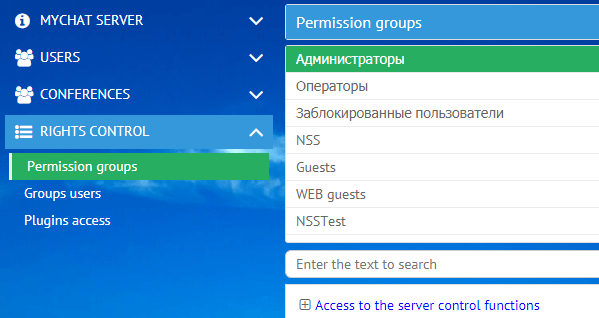Manage rights groups for MyChat users; configuring accesses

Rights groups in MyChat are used to allow or forbid user to access various chat services. All changes are applied "on the fly", you do not have to restart the server.
Any MyChat user must be necessarily included in one rights group only. Users who register on the server by themselves are added to the group "Guests" or "WEB guests".
Manage groups
You can create, rename, delete or make duplicates of any groups for user rights. There is only one limitation: all groups must have unique names.
"Guests" and "WEB guests" are system groups. You can't delete them but you can assign any rights to them.
If you delete a rights group that has users in it all of them will be automatically transferred into the system group "Guest".
Group rights configuration
Each rights group is divided into several sections, sorted alphabetically.
There are many rules to find something, so use a filter for names.
Description of rules for rights groups
Rules specifically for MyChat on Android users.
Access to server management functions
Separation of access levels to the server for different administrators.
Access to administrative functions.
Permissions for using a common announcement board.
Work with personal contacts and access to the common tree-like contact panel of MyChat Server.
User rights of general-purpose that does not correspond to a specified section.
Notifications
Plugins (addons)
Permissions and limitations in multi-user conferences.
Special rules for administrators to avoid punishments and limitations from moderators.
Rules for a fine-tune configuration. How to use MyChat integration tools with other services.
Access rules for project and task management.
MyChat Server rights groups for assigning various tasks that are executed on MyChat Client applications.
Section for managing communication abilities in one-to-one mode and for calls/file transferring.
Logging
Profile
Files
MyChat Guest & website support
Rules for services for website support and inviting users in MyChat.
Access to common user groups: creating, deleting, editing personal groups.